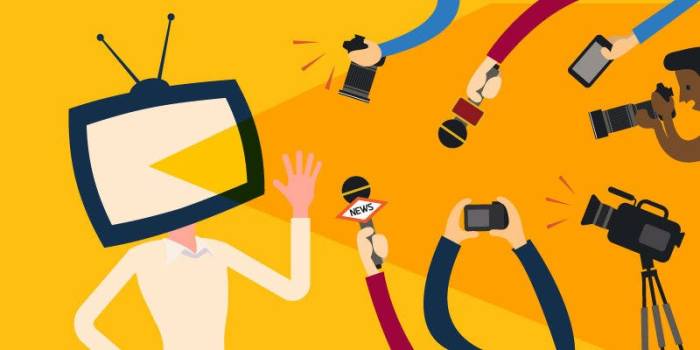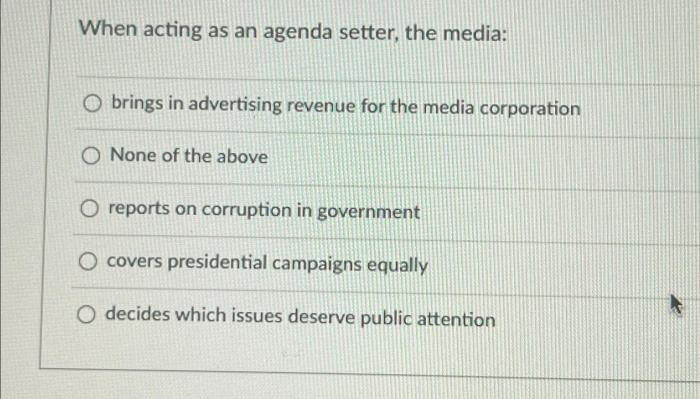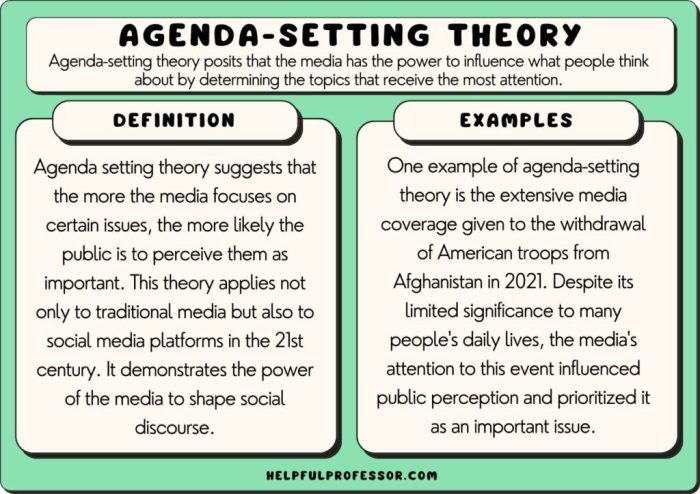When acting as an agenda setter the media – When the media assumes the role of agenda setter, it wields immense power in shaping public discourse and influencing political landscapes. This profound impact warrants exploration, as it carries significant implications for democracy, citizen engagement, and informed decision-making.
The media’s ability to prioritize and highlight certain issues elevates their prominence in the public consciousness, potentially eclipsing other matters of equal or greater importance. This selective focus can influence the way citizens perceive and respond to various societal concerns, ultimately affecting the policy agenda and the allocation of resources.
Media’s Role in Agenda Setting

The media plays a pivotal role in shaping public opinion and influencing political discourse through agenda setting, a process by which the media prioritizes certain issues over others, thereby influencing the public’s perception of their importance.
Examples of Media Coverage Influencing Issue Salience
- The media’s extensive coverage of the Watergate scandal in the 1970s contributed to the public’s awareness and concern about political corruption.
- The media’s focus on climate change in recent years has raised public awareness of the issue and its potential consequences.
Impact of Media Framing on Public Perceptions
The way the media frames an issue can significantly influence public perceptions. For example, framing an issue as a threat or crisis can elicit fear and urgency, while framing it as an opportunity can evoke optimism and support.
Factors Influencing Agenda-Setting Power

Media Ownership, Concentration, and Market Competition
The ownership structure of the media can influence its agenda-setting power. Concentrated ownership, where a few large corporations control a significant portion of the media, can lead to a narrower range of perspectives and a greater likelihood of issues being framed in a way that aligns with the owners’ interests.
Political Ideology and Biases
The political ideology and biases of media outlets can also affect agenda setting. Outlets with a particular ideological orientation may prioritize issues that align with their beliefs and downplay or ignore issues that contradict them.
Consequences of Media Agenda Setting: When Acting As An Agenda Setter The Media

Potential for Media Manipulation and Echo Chambers
Media agenda setting can be used to manipulate public opinion by selectively presenting information that supports a particular agenda. This can lead to the creation of echo chambers, where individuals are only exposed to information that reinforces their existing beliefs.
Implications for Citizen Engagement and Informed Decision-Making
Media agenda setting can have a significant impact on citizen engagement and informed decision-making. By prioritizing certain issues over others, the media can influence the public’s understanding of the most important issues facing society and shape their voting behavior.
Challenges to Media Agenda Setting

Rise of Social Media and Fragmentation of Media Landscape
The rise of social media and the fragmentation of the media landscape have challenged traditional media agenda setting. Individuals can now access information from a wider range of sources, and social media algorithms can personalize content based on individual preferences, reducing the influence of traditional media outlets.
Audience Selectivity and Personalization
Audience selectivity, where individuals actively choose to consume information that aligns with their existing beliefs, further challenges media agenda setting. This can lead to the creation of “filter bubbles,” where individuals are only exposed to information that confirms their own views.
Comparative Perspectives on Agenda Setting
Cultural, Political, and Economic Factors, When acting as an agenda setter the media
The role of the media in agenda setting can vary significantly across different countries or regions due to cultural, political, and economic factors. For example, in authoritarian regimes, the media may be more tightly controlled by the government, limiting its ability to independently set the agenda.
Implications for Cross-Cultural Communication and Global Media Flows
Understanding the different factors that influence agenda setting in different countries is important for cross-cultural communication and global media flows. It allows media practitioners and policymakers to tailor their strategies to effectively reach and engage audiences in different cultural contexts.
Essential FAQs
How does the media’s ownership structure impact its agenda-setting power?
Media ownership concentration can lead to a narrower range of perspectives being presented, as the agendas of a few dominant owners may take precedence over diverse viewpoints.
What are the potential consequences of media agenda setting for citizen engagement?
When the media focuses on a limited set of issues, it can create the illusion that these are the only pressing concerns, potentially discouraging citizens from engaging with a broader range of societal problems.